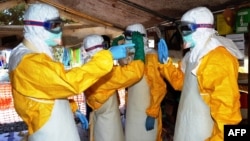Guinea's main Ebola treatment center at Donka Hospital in Conakry has more than 70 patients, but only 48 beds.
Many of the sick are not from the capital, but they come seeking treatment anyway.
While the country's national coordination team against Ebola says it is opening more treatment facilities across the country to stop patients from having to make the trek, the country has been overwhelmed by new cases in the past month.
For Danphron Saffi, 30, an Ebola survivor who was treated here, the hardest part of her ordeal came after she was released.
After finally testing negative for Ebola, she is no longer contagious and considered immune to reinfection, but her family rejected her anyway.
She says she also lost her job as a teacher, explaining that education officials refused to give her a classroom for fear that her presence would haved stigmatized the school.
So she has come back to the treatment center where she is helping doctors care for patients by providing emotional support and reassuring patients that they too can be cured.
One of about 600 people believed to have been cured of Ebola in Guinea, Saffi says her country must do more to help survivors.
"It is not an easy task to treat an Ebola patient, but now is the time to help those cured to find their place in society," she said.
For Guinea, the epidemic started in southeastern reaches of the country late last year, after which it spred to other parts of the country. The capital, Conakry, continues to report new cases, as well as several towns in the southeast.
Guinea has opened new treatment centers in Forecariah and Kindia near the Sierra Leonian border. Each center has 20 beds and 10 doctors.
President Alpha Conde says Ebola will be kicked out the country by the end of the year. Schools remain shut and health workers continue to complain that the government is not paying their allowances.




